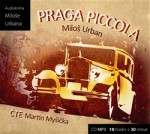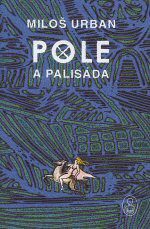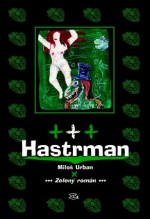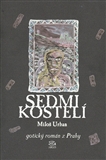Novelist, translator, publishing editor and author of stage plays. Winner of the Magnesia Litera (2002) and the Mladá fronta Prize (1996) for his translation of Barnes’ novel Flaubert’s Parrot. His books have been published in many languages including English, German, Spanish, Polish and Italian. He is especially popular in Spanish-speaking countries, where his novels sell tens of thousands of copies. He was born in Sokolov on 4 October 1967.
Miloš Urban
| Title | Publisher | Year | Selected published translations | Awards |
|---|---|---|---|---|
| Carlsbad (Kar) | Argo | 2019 | ES | |
| Urbo Kune | Argo | 2015 | ||
| The Final Mark on the Manuscripts (Poslední tečka za Rukopisy) | Argo | 2014 | ||
| The Water-Goblin (Hastrman) | Argo | 2014 | ES |
2002 Magnesia Litera – Prose |
| The Seven Churches (Sedmikostelí) | Argo | 2014 | FR | EN | IT | PL | ES | RU | DE | NL | |
| She Came from the Sea (Přišla z moře) | Argo | 2013 | ES | |
| Praga Piccola (Praga piccola) | Tympanum | 2013 | ||
| Praga Piccola (Praga piccola) | Argo | 2012 | ||
| Boletus arcanus (Boletus arcanus) | Argo | 2011 | ||
| Michaela (Michaela) | Argo | 2008 | ||
| Lord Mord | Argo | 2008 | PL | EN | DE | ES |
2008 The Most Beautiful Czech Book – Literature: 3rd prize |
| Dead Girls (Mrtvý holky) | Argo | 2007 | NL | |
| Fields and Palisades (Pole a palisáda) | Argo | 2006 | ||
| Knives and Roses or The Topless Party (Nože a růže aneb Topless party) | Větrné mlýny | 2005 | ||
| Santini’s Language (Santiniho jazyk) | Argo | 2005 | ES | |
| Michaela (Michaela) | Argo | 2004 | ||
| A little Love (Trochu lásky) | Větrné mlýny | 2003 | ||
| The Shadow of the Cathedral (Stín katedrály) | Argo | 2003 | NL | DE | PL | ES | |
| Memoirs of an MP (Paměti poslance parlamentu) | Argo | 2002 | ||
| The Seven Churches (Sedmikostelí: Gotický román z Prahy) | Argo | 2001 | FR | EN | IT | PL | ES | RU | DE | NL | |
| The Water Wizard (Hastrman) | Argo | 2001 | ES |
2002 Magnesia Litera – Prose |
| The Seven Churches: The Gothic Novel of Prague (Sedmikostelí: Gotický román z Prahy) | Argo | 1999 | FR | EN | IT | PL | ES | RU | DE | NL | |
| The Final Mark on the Manuscripts (Poslední tečka za Rukopisy) | Argo | 1998 |

The Final Mark on the Manuscripts
Poslední tečka za Rukopisy

Praga Piccola
Praga piccola

Michaela
Michaela

Dead Girls
Mrtvý holky

Fields and Palisades
Pole a palisáda

Knives and Roses or The Topless Party
Nože a růže aneb Topless party

Michaela
Michaela
Trochu lásky
Miloš Urban
A little Love
Trochu lásky

Memoirs of an MP
Paměti poslance parlamentu
Poslední tečka za Rukopisy
Miloš Urban
The Final Mark on the Manuscripts
Poslední tečka za Rukopisy
| Award | Year | Country |
|---|---|---|
| The Most Beautiful Czech Book – Literature: 3rd prize | 2008 | Česká republika |
| Magnesia Litera – Prose | 2002 | Česká republika |
Praise
With Scandanavian novels being in vogue, the detective genre in the Czech Republic has undergone a renaissance after many lean years, and we’re beginning to discover authors who can at least match the global average. This can also be said about Urban’s contribution: She Came from the Sea is a novel written by a fairly steady hand, it is sufficiently engaging and at the same time believable.
—Pavel Mandys
Hospodářské noviny
He graduated in Nordic Studies and English Studies and worked as a publishing editor at Mladá fronta and then as an editor-in-chief for the publishers Argo, which have also brought out his books. He debuted with the mock-documentary novel Poslední tečka za rukopisy (The Final Mark on the Manuscripts, Argo, 1998), which he published under the pseudonym Josef Urban. That is also the name of the narrator of the novel, a historian who eventually uncovers the truth about the Dvůr Králové and Zelená Hora manuscripts and the secret of their plagiarists. The book was exceptionally well received and Argo reissued it in 2005, this time under the author’s real name.
This was followed by the novel Sedmikostelí (The Seven Churches, Argo, 1998), written in the spirit of Gothic novels and tales of terror, full of melancholy and murder in the middle of old Prague, and Hastrman (The Water-Goblin, Argo, 2001), for which Urban received the Magnesia Litera for best prose work. The hero is an actual Water-Goblin, a creature whom Urban tracks across two centuries in order to use him as a way of describing environmental threat and human expansionism. As Ladislav Nagy writes on iLiteratura.cz, “The last two novels show Urban as a poet and at the same time the archivist of a lost landscape, be it an urban or natural one. Churches sacrificed to the advance of urbanization, villages buried beneath an artificial lake, a mined-out hill, these are aspects of the landscape which have disappeared beneath the sediment of time – although they live on in the memory – which are reflected in the plurality of the temporal and semantic layers of the text.”
The “sexy novel” Paměti poslance parlamentu (Memoirs of an MP, Argo, 2002) – “the most searing, most bizarre and most anarchistic condemnation of democratic totalitarianism” – surprised readers and reviewers by being so different from Urban’s previous work. In the novel Stín katedrály (The Shadow of the Cathedral, Argo, 2003) the old familiar gothic Urban is back. Like Viktor Hugo, Urban finds the cathedral so fascinating that he makes it the main character of his historical crime novel. This clearly follows on from Sedmikostelí, with the notional trilogy being concluded by Santiniho jazyk (Santini’s Language, Argo, 2005). This is a work worthy of Dan Brown – the main character Martin Urann (on a keyboard the letter B from the author’s surname is right next to the letter N from the main character’s surname) is struggling in his job as an advertising copywriter. He has the task of thinking up a universal slogan which can be used for anything. Thanks to a girl whom he meets by chance in the metro, he immerses himself in history, churches, secrets and saints, only to discover that throughout history all of humanity, like him, has been searching for a single universal sentence.
Pole a palisáda (Fields and Palisades, Argo, 2007) with the subtitle Mýtus o kněžně a sedlákovi (The Myth of the Princess and the Farmer) is a variation on the legend of Princess Libuše and Přemysl the Ploughman. The book is part of the international Myths project launched by the British publishing house Canongate, which already involves 35 countries, in which modern retellings of myths by authors from around the world are published.
The anthology Mrtvý holky (Dead Girls, Argo, 2008) translates “ten strange stories” from 2002 – 2006. As a review in Právo states, “Urban writes wonderful gothic mystery stories – and even Jakub Arbes might envy him this collection. Anton Pavlovič Čechov said that brevity is the sister of talent. This is the proof.”
Lord Mord (Argo, 2008) returns to a story from old Prague and the slum clearance ordered by the city authorities in the late 19th century. The murdering of prostitutes as one of the novel’s themes is only an echo of the second, which is the murdering of the city itself.
The novel Boletus arcanus (Argo, 2011) makes sophisticated use of the Czech passion for mushroom picking. In the forests grows a mushroom which, when eaten, will fulfil any wish a person might have. The main character, Gregor Marty, is not the only one who can confirm that this is about a dependency on more than drugs.
The novel Praga picolla (Argo, 2012) is for Urban a rather uncharacteristically traditional historical tale about the First Republic’s joys and sorrows, which came with the crisis or perhaps actually long before it – it depended on whether you were the son of an automobile factory owner or a servant or maid.
This was followed by the novel Přišla z moře (She Came from the Sea, Argo, 2014), conceived broadly as a detective-style search for the identity of a girl who stepped out of the sea one morning onto British shores. What at first seems to be just a diversion for the editors of the local newspaper develops into a thriller of unexpected dimensions.
Miloš Urban’s most recent book is called Urbo Kune (Argo, 2015). The Viennese architect Jan Tabor called on European artists and writers to get involved in a project about a united Europe. Urban answered the call in his own distinctive way through this book. The novel is labelled sci-fi, but this is only one side of the coin. The other is the subtitle Paralelní román (Parallel Novel), which depicts the streets of a city, the Urbo Kune of the title (from Esperanto) – these run parallel to each other and can therefore never intersect. Or can they?













